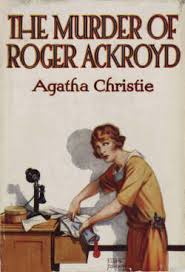 First published by Collins, the Crime Club, 1926.
First published by Collins, the Crime Club, 1926. 
The version I read was a facsimile edition published by HarperCollins Publishers in 2006, ISBN 0-00-723437-6, 312 pages.
Roger Ackroyd is a man of nearly fifty years of age, the life and soul of the little Sussex village of King's Abbot. Hercule Poirot, retired Belgian detective, has recently taken up a rental cottage in the village and is devoting his time and little grey cells to country pursuits such as growing marrows. He imagines that people don't really know who he is but his reputation has preceded him. When Roger Ackroyd is murdered in what appears to be a classic locked room mystery, Poirot jumps at the invitation to come out of retirement to participate in the investigation.
On the face of it, it is an open and shut case. At least the local police inspector, Inspector Davis, thinks so. Ralph Paton, Ackroyd's adopted heir has recently argued with Ackroyd and now has disappeared. Davis is all for issuing a warrant for Paton's arrest but Ackroyd's niece Flora who is engaged to Paton insists on the involvement of M. Poirot who happens to be a neighbour.
There are some interesting themes in this novel.
- King's Abbot is peaceful little village but under that tranquil surface there are some very nasty secrets indeed.This idea of seething disharmony and nasty things hidden in village life is a theme that reoccurs in the Miss Marple novels and more recently in Midsomer, a dangerous place to visit in Festivals.
- There's a lot in this novel about marital troubles. The original Mrs Ackroyd turned out to be a dipsomaniac who died four years after her marriage. Roger Paton is not a particularly nice person, not a good catch for the lovely Flora. In the "real" background this is 1926, the year that Chrisie's own marriage collapsed, with her husband announcing that he loved another, and at the end of the year her own famous "disappearing act" occurred.
- Christie was obviously still searching for an acceptable protagonist for her novels. Hercule Poirot had made his first appearance in THE MYSTERIOUS AFFAIR AT STYLES in 1920, and then again in THE MURDER ON THE LINKS. When THE MAN IN THE BROWN SUIT appeared in 1924 reviewers had apparently questioned why Hercule Poirot had been retired. From now on he would make almost annual or at least biennial appearances. But Poirot is not a country person.
- There's a problem with Poirot coming out of his retirement. Captain Hastings who was the narrator in the first two Poirot appearances, and Watson to Poirot's Holmes, has inconsiderately gone off to the Argentine. Christie who obviously felt Poirot needed a foil, and a narrator, decides to use the local doctor as his apparent confidante and we read the action in Dr. Sheppard's words. In fact Sheppard, while, like Hastings is still not entirely au fait with what Poirot is thinking, turns out to be an unreliable narrator, so the reader is to an extent deceived.
- Christie is also at this stage developing a panorama of background characters. There's mention for example of Inspector Japp of Scotland Yard, and of the local Sussex coroner Colonel Melrose.
In fact I didn't find it all that easy to read. It seemed chock full of information and facts, as if Christie was trying to pour everything into my brain, to see if I could sift the chaff from the wheat, and come up with the answer. For me also the novel is an illustration of my conviction that she doesn't always play fair with the reader. You can follow this idea up here.
My rating: 4.2
If you are interested in the TV version with David Suchet as Hercule Poirot, here are the opening scenes, via YouTube.
Once you have viewed it you will find subsequent "episodes" are available.
Be warned though, there are significant differences between the original book and the TV version.
2 comments:
Very helpful background info here. I have been watching the David Suchet adaptations for years, but last week's read of Roger Ackroyd was my first time with one of Christie's books. Mysteries without Hastings (and Japp) always make me sad, but I think the extra special twist ending on this one is probably worth it. (My totally spoiler-y review will be posting tomorrow morning.)
I'll look forward to hearing about it Nicole
Post a Comment